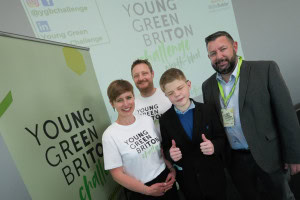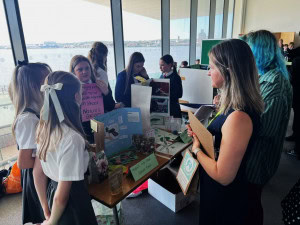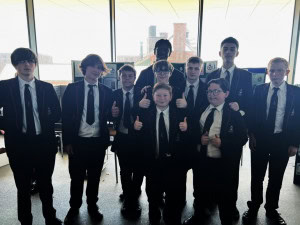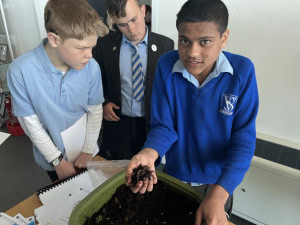A bug hotel, kinetic energy pads and sustainable fashion are amongst the innovative ideas pupils from five Liverpool City Region schools created to help combat climate change, with support from Mayor Steve Rotheram’s Community Environment Fund.
They went head-to-head with schools from across the North-West in a bid to be crowned the Young Green Briton Challenge Champions of the North-West.

Pic L-R: Kat Crisp – Executive Director of Social Innovation for All and Co-founder of the Young Green Briton Challenge, Martin Foulkes – Executive Director EcoVida Routes, Bo Cox – pupil at St Vincent’s Specialist School for Sensory Impairments, Councillor Anthony Burns – Liverpool City Region Cabinet Member for Net Zero and Leader of St Helens Council.
Judges gathered at the Museum of Liverpool to consider the proposals and choose which projects would go through to the next stage.
Maghull High School’s Go Great Go Green project, St Vincent’s Community Compost and Kings Leadership Academy’s BouncePadz idea will now represent the city region in the national final in London in July.

Maghull High School team members.
The innovative inventions were developed as part of the Young Green Briton Challenge, one of the projects which successfully applied to this year’s £350,000 Community Environment Fund (CEF).
£15,000 in funding from the CEF allowed Community Interest Company, Social Innovation for All, in partnership with Widnes-based EcoVida Routes, to help the young people put their ideas into action.
They engaged with more than 800 pupils across the Liverpool City Region through educational workshops and Dragon’s Den style pitches and funded the development of their green solutions, which faced fierce competition to make it to the regional final.
Councillor Anthony Burns, Cabinet Member for Net Zero and Leader of St Helens Council, opened the competition. He said:
“The Community Environment Fund supports grassroots community projects, but they are part of the much bigger picture of our future. The Liverpool City Region is leading the green transition. We’re pressing ahead with our target of becoming net zero by 2035 and we’re looking into sustainable options such as Mersey Tidal Power.
“Having seen the entries, I was very impressed with the standard and the innovative thinking behind these projects. The planet is in the hands of future generations and these young people have worked hard and given a great deal of consideration to their projects. Congratulations to all the finalists.”
Now in its third year, the Young Green Briton Challenge enables young people between the ages of 11 and 16 to design, present and implement innovative ideas for tackling climate change locally. It has supported approximately 14,000 children across the country.
Kat Crisp Executive Director of Social Innovation for All and Co-founder of the Young Green Briton Challenge said:
“We’ve been delighted to have the support of the Community Environment Fund this year to work with the schools taking part across the Liverpool City Region because it’s allowed us to respond to the demand from schools to be involved with the Young Green Briton Challenge programme and to grow in the North-West.
“Today has been a fantastic event. It’s a great a chance for students to proudly share the amazing projects they’ve developed to address real-world sustainability issues in their local communities, and they should all be very proud of what they have achieved.”
This year, 2024-2025, the Liverpool City Region Community Environment Fund has supported a total of 18 community schemes. Organisations could apply for up to £30,000 for initiatives that encouraged long-term behavioural change, while improving the city region’s environment and safeguarding its green spaces.

Pupils from Kings Leadership Academy Hawthornes in Bootle.
In addition, projects were encouraged to develop engagement for their initiatives in their local area by working with community fundraising platform Spacehive, to crowdfund for their transformative efforts.
Councillor Gill Wood the Combined Authority’s Deputy Cabinet Member for Net Zero and Vice Chair of the city region’s Climate Partnership was one of the judges. She said:
“I was faced with some tough choices! I really enjoyed seeing such variety in the ideas and how they would be implemented. This challenge has empowered the young people to become eco-innovators, it has equipped them with the skills and motivation to thrive in the green economy and helped them aspire to make change in the world.
“They’ve been provided with the tools and knowledge to bring their green ideas to life, and I think this will inspire them to lead the way toward a more sustainable future.”
The Community Environment Fund has already supported 92 local environmental projects including community gardens, bikes for veterans, beekeeping and food growing initiatives.

Pupils from St Vincent’s Specialist School for Sensory Impairments with an example of their community compost.
Since its launch in 2022, the Community Environment Fund has seen more than 750 people across the city region volunteer time to deliver projects creating 15,000 square metres of new habitat, planting 30,000 plants and trees and producing over 8,000 kg of sustainable food to deliver positive environmental change at a grassroots level to local communities and for the future of our planet.
The fund has been supported by the Liverpool City Region Climate Partnership which was set up to provide expert advice on tackling the climate emergency.
Who is in the final?
- Maghull High School – Go Great Go Green
- St Vincent’s Specialist School for Sensory Impairments – Community Compost
- Kings Leadership Academy – Bounce Padz
- Co-op Academy Belle Vue – 4 seasons for Ponds
- Longdendale High School – Caraplastics
- Fairfield High School – Sustain Inhale
- Sale Grammar School – Eco Endure
- Falinge Park High School – Thinking Caps

